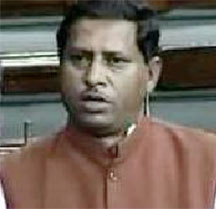NEW DELHI, (Reuters) – Attempted murder, waging war on the state, criminal intimidation and fraud are some of the charges on the rap sheets of ministers Indian Prime Minister Narendra Modi appointed to the cabinet on Sunday, jarring with his pledge to clean up politics.
Seven of 21 new ministers face prosecution, taking the total in the 66-member cabinet to almost one third, a higher proportion than before the weekend expansion.
At least five people in the cabinet have been charged with serious offences such as rape and rioting. Finance Minister Arun Jaitley said any suggestions there were criminals in the cabinet were “completely baseless.
“These are cases arising out of criminal accusations, not cases out of a crime,” he told reporters on Monday, adding that Modi had personally vetted the new ministers.
Ram Shankar Katheria, a lawmaker from Agra, was appointed junior education minister yet has been accused of more than 20 criminal offences including attempted murder and promoting religious or racial hostility.
Katheria was not immediately available for comment.
The inclusion of such politicians does not sit easily with Modi’s election promise to root out corruption, and has led to criticism that he is failing to change the political culture in India where wealthy, tainted politicians sometimes find it easier to win votes.
“It shows scant respect for the rule of law or public sentiment,” said Jagdeep Chhokar, co-founder of the Association for Democratic Reforms (ADR) which campaigns for better governance. “Including these people in the cabinet is a bad omen for our democracy.”
Modi won the biggest parliamentary majority in three decades in May with a promise of graft-free governance after the previous government led by Congress party was mired in a series of damaging corruption scandals.
NEW CABINET MORE TAINTED THAN OLD?

Soon after coming to power, Modi called for courts to fast track cases against politicians in an effort to curb political criminality in the world’s largest democracy. Cases in India’s overstretched judicial system often drag on for years.
Yet Modi’s cabinet includes twice as many politicians facing criminal charges as the previous Congress party one. Hansraj Gangaram Ahir, the new junior chemicals and fertilizer minister, was another eye-catching choice. He is charged with around 20 offences, including intent to wage war against India, criminal intimidation and abetting a mutiny.
Ahir did not respond to requests for comment, and it was not immediately clear what incidents the more serious charges pertained to. His secretary said the cases were politically motivated.
Ahir is best known for helping unearth corruption in the coal industry while he served on a parliamentary committee.
Shrikant Sharma, a spokesman for Modi’s ruling Bharatiya Janata Party (BJP), said it was up to courts to decide if ministers were guilty, and said many of the charges related to political rivalries.









